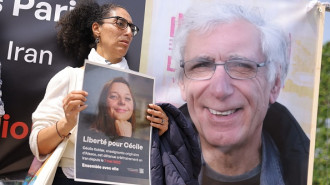Saudi Arabia 'a threat' to Lebanon says former UK FM Jack Straw
Saudi Arabia poses a "threat: to stability in Lebanon, former UK Foreign Secretary Jack Straw said on Saturday, warning calmer heads must prevail in the kingdom to prevent a broader crisis.
Policies by the young Crown Prince Mohammed bin Salman risk destabilising the region, Straw said at a conference on Saudi Arabia hosted by Middle East Monitor on Saturday.
"The generation I dealt with were much more cautious," Straw, who held the senior position during 2001 to 2006, said.
"They were much more cautious when it came to the social environment in Saudi Arabia. ... Saudi foreign policy could end up as a threat in Lebanon unless wiser council prevails."
The comments came during increasing tension between Saudi Arabia and Lebanon, after the unprecedented resignation of Lebanese Prime Minister Saad al-Hariri from Riyadh.
Hariri pointed toward Iranian influence in Lebanon and slammed Hizballah before stepping down as prime minister of the state, echoing similar rhetoric that has been increasingly spewed by Saudi Arabia in recent months.
But Straw - who took part in negotiations over Iran's nuclear programme in the early 2000s - advised it best to accept the realities of groups like Lebanon's Hizballah and Palestine's Hamas.
"Hizballah as a political force is a reality in the Lebanon," he said, adding he is "unhappy about our boycotting of Hamas. I talked off the record to some journalists in Riyadh in early 2006 and said we ought to be talking to Hamas", he said.
"Some people say I was removed from the post of foreign secretary" because of these comments, he suggested.
Saudi Arabia's Mohammed bin Salman - also known as MbS - has hit international headlines for his recent radical shift in policies, including allowing women to drive in the kingdom and allegedly clamping down on corruption, even among royal ranks.
But despite the moves, dubbed as nothing more than a hollow "PR stunt" by analysts and campaigners, including Saudi Madawi al-Rasheed, MbS has failed to shake off criticism for spearheading a Saudi war on Yemen's Houthi rebels that has left more than 10,000 dead.
Earlier this month, Saudi Arabia announced it shut down all ports after intercepting a Houthi ballistic missile near Riyadh's international airport.
The kingdom accused Iran of supplying the missile, saying it bore "Iranian markings" - the Houthis have denied that.
The move attracted widespread criticism and international aid groups have warned millions of Yemenis are at severe risk.
The UN has listed Yemen as the world's number one humanitarian crisis, with 17 million people in need of food, seven million of whom are at risk of famine.
"The key cause of the humanitarian crisis in Yemen is the blockade and the bombings by the Saudis and the UAE," Straw said.
He warned that "as long as Saudi thinks that major Western countries are going support whatever they do, regardless, they're" going to keep doing what they're doing.
![Jack_Straw [MEMO] Jack_Straw [MEMO]](/sites/default/files/styles/large_16_9/public/media/images/106BCB74-1860-4A9D-B7F1-83F88759A2E8.jpg?h=d1cb525d&itok=7vJUfYJy)
![Palestinians mourned the victims of an Israeli strike on Deir al-Balah [Getty]](/sites/default/files/styles/image_684x385/public/2024-11/GettyImages-2182362043.jpg?h=199d8c1f&itok=xSHZFbmc)


![The law could be enforced against teachers without prior notice [Getty]](/sites/default/files/styles/image_684x385/public/2178740715.jpeg?h=a5f2f23a&itok=hnqrCS4x)
 Follow the Middle East's top stories in English at The New Arab on Google News
Follow the Middle East's top stories in English at The New Arab on Google News

![The law could be enforced against teachers without prior notice [Getty]](/sites/default/files/styles/image_330x185/public/2178740715.jpeg?h=a5f2f23a&itok=xMdFOAIF)
